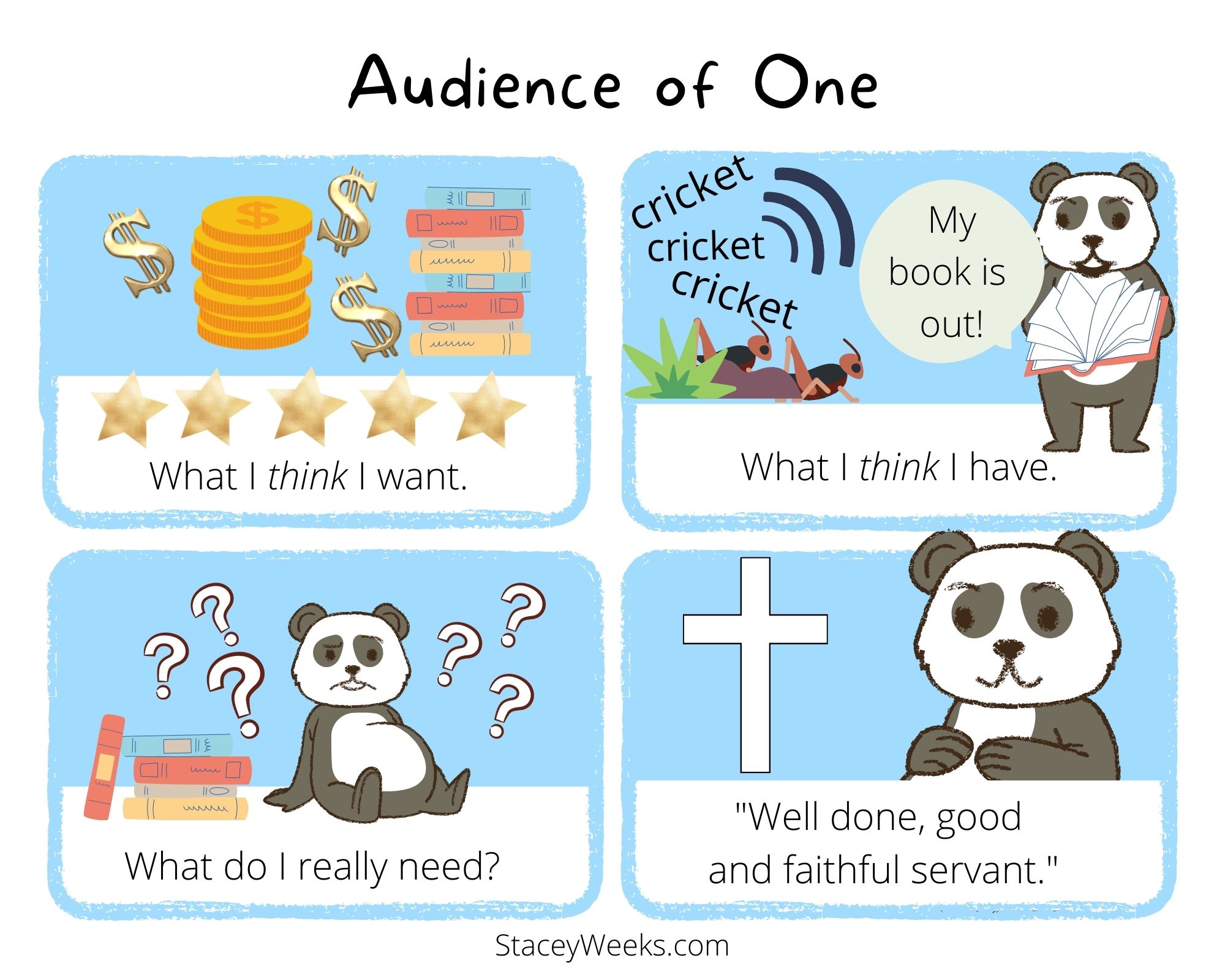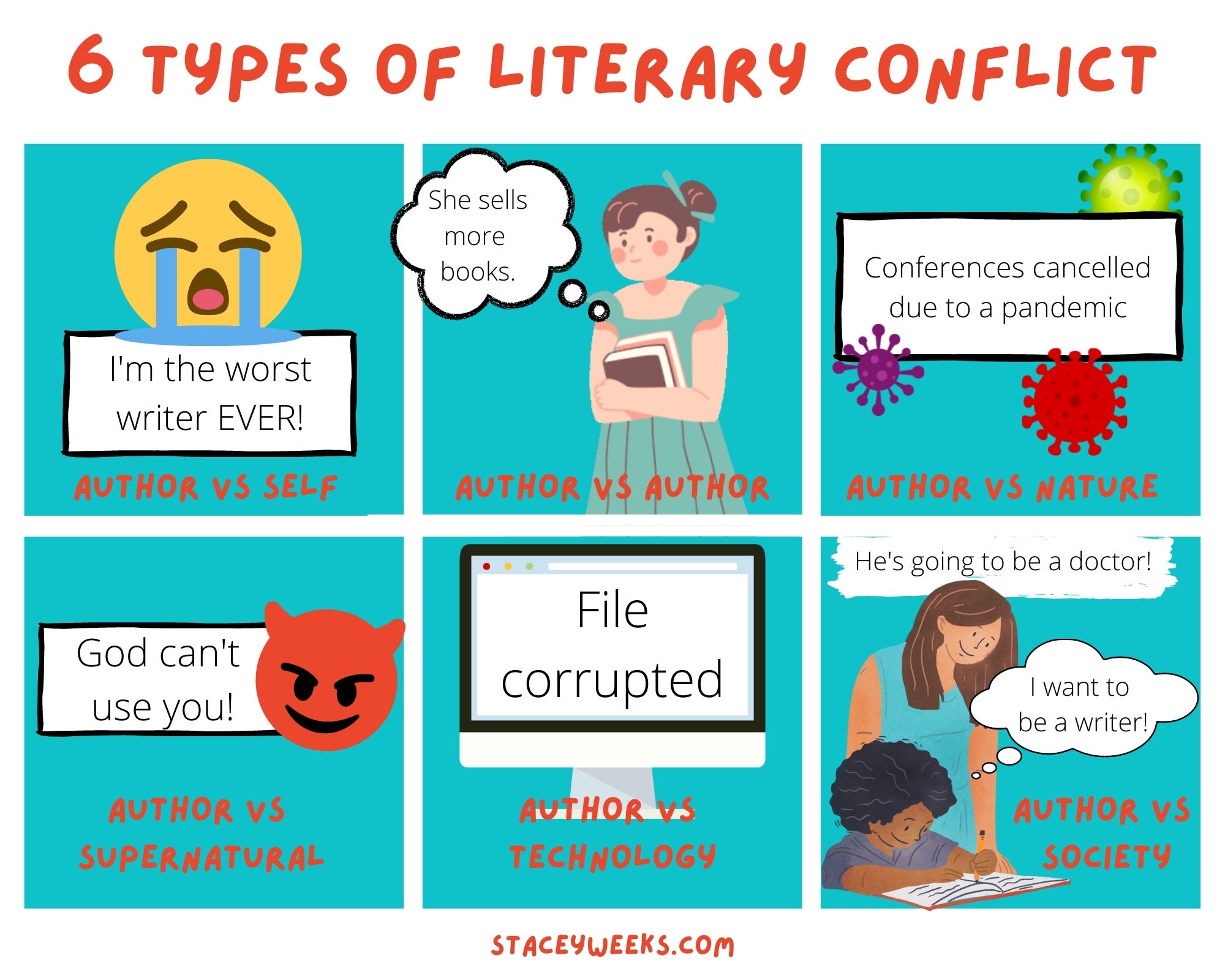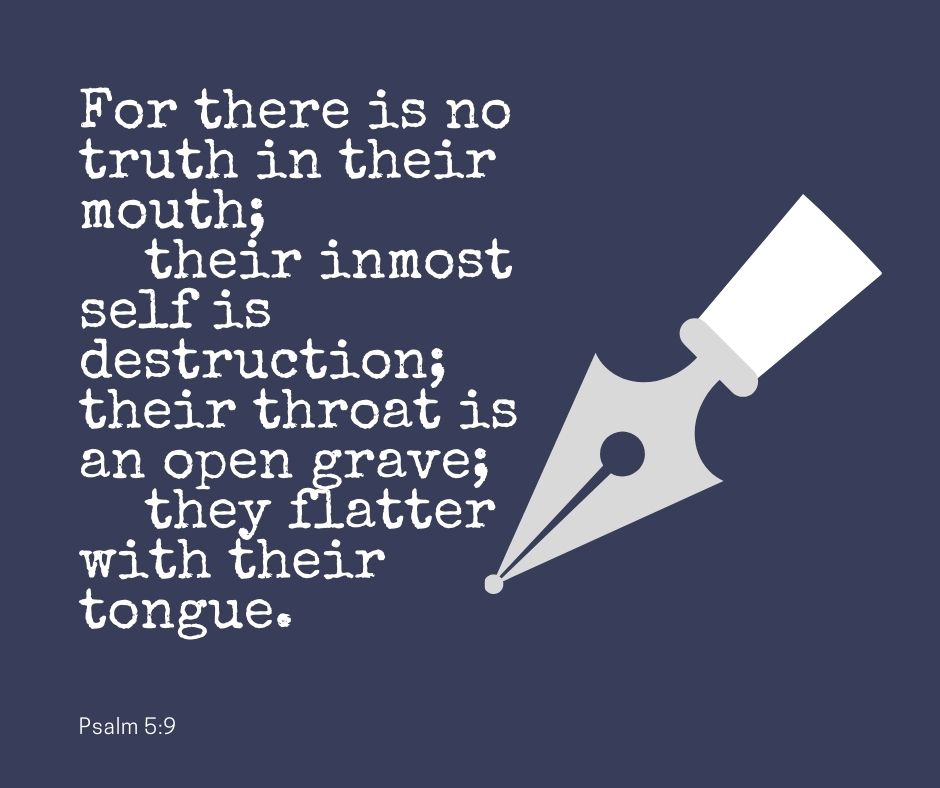
Katie’s Comics – Audience of One




By: Shannon Popkin
Even after I had several articled published in magazines, I didn’t call myself a writer. Even though I spent most of my free time writing, it felt too presumptuous to say, “I’m a writer.” Instead, I would say, “I like to write.” Or, “I have written a few things.” But to give myself the title, writer? I just couldn’t do it.
That is, not until I approached the registration table at my very first writer’s conference. I looked down at the label on my nametag and there it was: Writer. I hesitated, glancing out at the atrium filling with people who actually were writers. Did I need their permission? Should I show someone credentials?
Putting on that nametag felt like a deeply solemn thing to do. I took a deep breath and with gravity, feeling the weight of the action, I slipped it on.
Fear is the number one thing that prompts writers and speakers to bury our “talent” in the ground, rather than investing and multiplying what we’ve been given by God. Instead of stepping up onto our platforms to boldly proclaim truth, we slip into the back section of the auditorium, labelled “Still Too Afraid”.
What sort of fears hold us back?
Do any of these sound familiar? If fear is holding you back, I’d like to offer you one simple strategy for gathering courage as you step out to write or speak, using your God-given talent. I call it the Principal of the Foreword.
A foreword in a book is the “word” that comes “before” the main message. The foreword often offers an explanation of how this material evolved or it gives the backstory, telling what prompted the author to write it.
Instead of asking you to think about the foreword of your next book, I encourage you to think about the foreword for your ministry as a whole. How did this all begin for you? What set you on this path, in the first place?
As you consider your “foreword”, consider asking yourself these three questions:
Take some time to think through these questions thoughtfully. Reflect and journal your responses. Consider the various legs of your platform-growing journey. Now go back and title your journal response, “My Foreword”.
Often the foreword of a book is written by someone with expertise, giving the book credibility. As you glance through your journal entry, ask yourself, “Who wrote my foreword?” If you think deeply, I think you’ll come to the conclusion that you didn’t actually write this backstory. God did.
God is the one who wove together the happenstance of your life, creating significant experiences which stirred up the messages inside of you. God also is the one who brought people to encourage, affirm, and train you. And God alone has opened the doors you’ve walked through. He’s given you opportunities and platform-building experiences.
Do you agree that God is the author of your foreword? To emphasize this, at the end of your journal entry, write, “Written by: God”.
Why is this helpful? How does this exercise grant new confidence?
Suppose you’re cringing at the thought of sharing your news about a book contract on social media. Or suppose you’re worried about what people would think if you present yourself as an “expert” on any given subject. Suppose you are quivering in a corner, with a decided case of impostor syndrome, thinking, “Why did I ever set out to do this?”
In times like these, go back to your foreword. Remind yourself of the ways that God gave you this message. Review the ways other Christians have affirmed your gifts and calling. Look back at all of the doors God has opened in the past. The opportunity you now face is just one more door to step through!
Reviewing your Foreword helps put your message into context. You aren’t stepping out on a platform to share your big ideas with the world. You’re stepping out onto the platform God put under your feet to share the message he prompted you to deliver.
As you step out onto your platform, you’re part of something much bigger than yourself. You’re part of the bigger story of God.


Influence: Building a Platform that Elevates Jesus (Not Me), was co-authored by Shannon Popkin and Kate Motaung, and is designed to help you think about how to gather followers of Jesus and change the world—but not in the way the world says to. Check out Shannon’s site for more resources and take the Influence Quiz here.
Bestselling author and speaker Shannon Popkin loves to blend her gifts for storytelling and humour with her passion for God’s Word. Shannon is the co-author of Influence: Building a Platform to Elevate Jesus (Not Me) and Control Girl: Lessons on Surrendering Your Burden of Control from Seven Women in the Bible. She is also a contributing blogger at Revive Our Hearts.
Shannon is happy to be sharing life with Ken, who makes her laugh every single day. Together, they live the fast-paced life of parenting three high school and college-aged kids. For more from Shannon, please go to shannonpopkin.com, or connect with her on Facebook, Twitter, or Instagram.

“Keep your tongue from evil and your lips from speaking deceit.”
Psalm 34:13
Telling the story of how God captured our hearts, led us to faith and repentance, and transformed our lives is often called sharing our testimony. Testimonies are powerful opportunities for believers to declare their confidence in the Lord, not only in what He has done in redeeming them, but in what He will continue to do for them as they walk in obedience, and how God longs to do this for others. These shared stories allow the church family to praise God together for His saving work in the lives of the people. They are a declaration of what God has done and an invitation to join in praising Him.
David begins Psalm 34 by declaring his story of confidence in the Lord. He tells a story of continual praise and invites his listeners to join him in magnifying the Lord. Throughout the first 11 verses, David intersperses a call to join the praise with details from his testimony.
David invites the humble to “magnify” and “exalt” the Lord (v3) because those who “look to him are radiant and unashamed” (v5). He implores the hearer to “taste and see the Lord is good” (8), to fear the Lord (9) and listen to him (11). He speaks of himself as a poor man who cried out to God, and the Lord heard. The Lord saved him from his troubles. His story is an invitation to believe that if God could hear, answer, deliver, save, and redeem him, then He can do this for the reader. He invites the people to come, listen, and fear the Lord (11).
The rest of the Psalm is filled with wisdom for the righteous. The man who wants to see good (12) must do good (14). The details of how this goodness plays out in the lives of the redeemed are sandwiched in between those statements, the redeemed should keep their tongues from evil (13). This command is so important that he rephrases it in the last part of the sentence, “keep your lips from speaking deceit.” The list continues. Turn from evil, do good, seek peace, pursue peace (14).

David acknowledges that the righteous will face troubles. The righteous will cry, be brokenhearted, crushed, and afflicted (12-19). But our souls can boast in the Lord because God delivers us. He slays the wicked and condemns those who hate the righteous (21). None who take refuge in God will be condemned (22).
If the redeemed should keep their tongues from evil (13), should redeemed authors keep their pens from evil? Should we keep our words from communicating deceit? How do we turn from evil, do good, seek peace, and pursue peace (14) while telling stories of brokenness and redemption?
Lord, we hear the wisdom of this passage. As Your children, the words we write and speak should be truthful, good, and peaceful. As we craft the necessary scenes to illustrate the fallen state of characters, we ask for the Spirit’s help to show the awfulness of life apart from You. We ask for the Spirit’s help to create character arcs that illustrate the saving power of Christ. Give us the courage to write boldly and the wisdom to differentiate between necessary details and sensationalism.



“For there is no truth in their mouth; their inmost self is destruction; their throat is an open grave; they flatter with their tongue.”
Psalm 5:9
In the previous devotional in this series, the tongue was a pen. This month, it is a tool for sinful flattery wielded by boastful evildoers. Words are versatile. As writers, we know that; our careers depend on it. Because words can be used for good and evil, we must type them carefully and thoughtfully.
In Psalm 5, the writer chooses powerful words to describe evildoers. They are liars with a desire for destruction (6, 9). Words like “destroy,” “abhor,” and “hate” communicate God’s feelings toward those who speak evil (5-6). The antagonist is bloodthirsty. His throat is an open grave (6, 9). The vivid imagery of God’s Word builds a complete picture. Those who speak lies and flattery are guilty and deserve to be cast out (6, 9, 10).

In contrast, the protagonist calls upon God to let those who take refuge in Him rejoice and sing for joy (11). These words of praise come from the righteous, who are protected, blessed, and covered with favor (11-12). The protagonist knows his propensity to use words for evil, so he proactively asks the Lord to hear his prayer (1-2). He prepares a sacrifice (3). He petitions the Lord to lead him and make his way straight (8). He knows what is easy for us to forget—we enter God’s house and bow in fear of Him through the abundance of His steadfast love (7).
In the New Testament, Paul quotes this passage in Romans 3:13 when he argues that all people are under the power of sin.1 At our core, we are liars with a desire for destruction. Apart from God, we would use our words for evil. Apart from God, we’d write and speak for our glory and fame instead of His. In Romans 3, Paul lays the groundwork for the rest of his argument; the only way we can be grouped in with the righteous instead of the evildoers is through repentance and dependence upon the shed blood and resurrection of Jesus. Jesus invites us into God’s house, where we bow in fear of Him through the abundance of His steadfast love.
The writer of Psalm 5 is referenced 13 times in the chapter, evildoers 16 times, the righteous 6 times, and the words or sounds that people utter 10 times. But God, our King and Lord, is referenced 30 times. So this chapter might communicate much about our words, but it says even more about our God.
God hears, loves, protects, blesses, and covers His people. He is righteous. He hates evil, destroys liars, abhors bloodthirsty and deceitful men. He does not delight in wickedness and will not allow evil to dwell with Him. He will cast out the guilty and rebellious. Does your writing represent this full picture of God? Does it illuminate His loving nature as much as His intolerance of sin? Does it celebrate His mercy while communicating His judgment?
Does your writing reflect an author that longs for the blessing of this holy God, all the while knowing it is undeserved (v12)? When you examine your word choices, are you like the psalmist, preparing a sacrifice and watching for God (v3)? Do you enter His presence bowed low in fear of Him (v7)? Do you ask for God to lead you and make your way straight (v8)? Or, are you more like the enemy? Are you full of lies and destruction with words like an open grave (v9), rebelling against God (v10)?
Meditate on Psalm 5. Ask God to reveal your heart. Ask God to ignite a fresh passion for writing that exposes the folly of the path toward destruction and judgment. In all your communications, thread themes of hope and redemption that lead to the Lord. The only way we can be made right with God is through the shed blood and resurrection of Jesus. Resolve today to represent this truth well.
1 Crossway Bibles. (2008). The ESV Study Bible (p. 946). Wheaton, IL: Crossway Bibles.